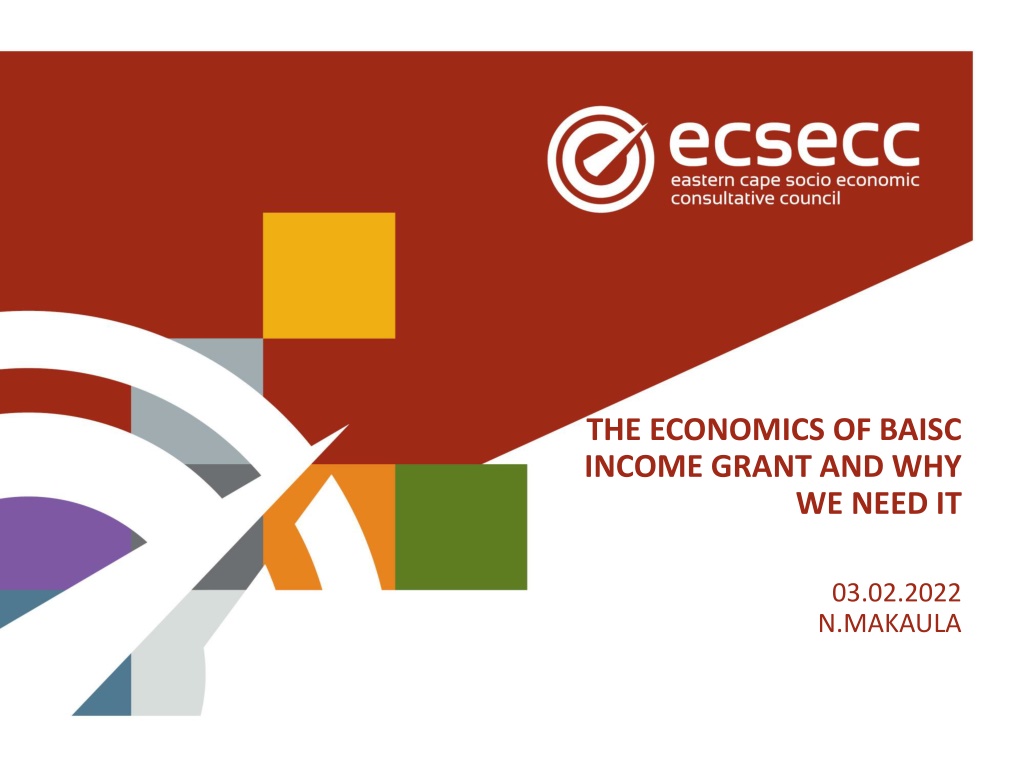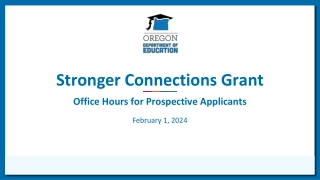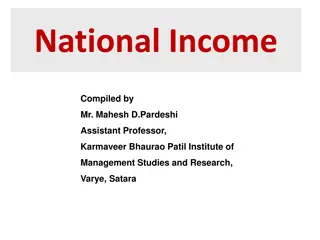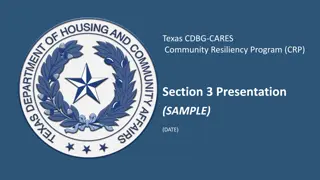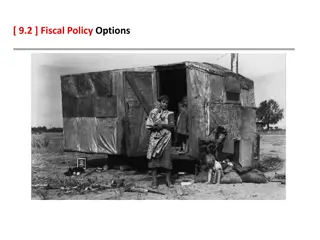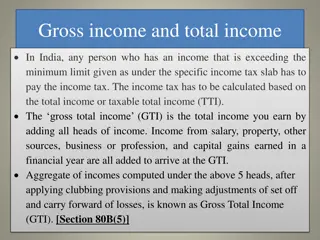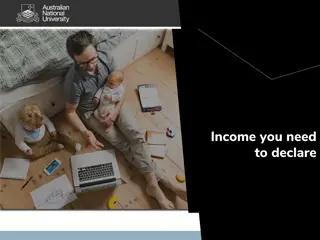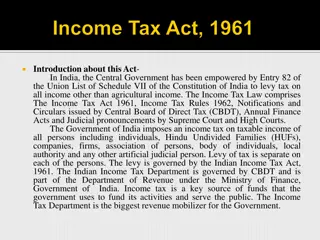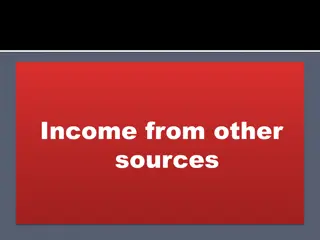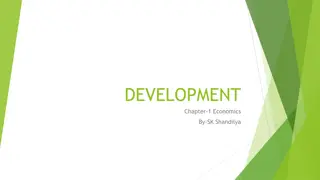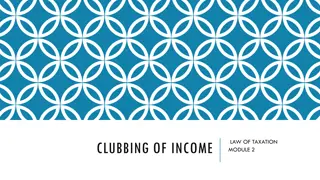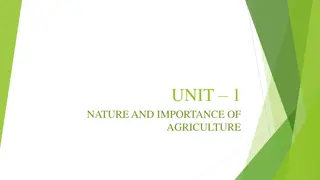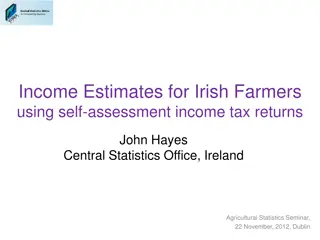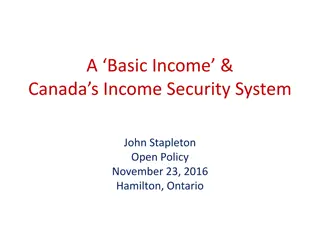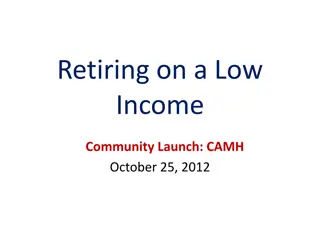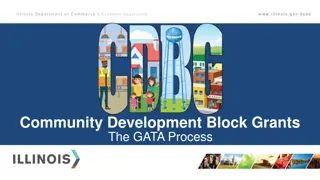The Economics of Basic Income Grant and Why We Need It
The Basic Income Grant (BIG) is a form of social assistance aimed at providing income to individuals unable to access employment. The article discusses the background and considerations around implementing BIG in South Africa, emphasizing the need for comprehensive social security reforms. Economic challenges, alienation of the human spirit, and joblessness underscore the urgency for such initiatives to address poverty and unemployment.
Download Presentation

Please find below an Image/Link to download the presentation.
The content on the website is provided AS IS for your information and personal use only. It may not be sold, licensed, or shared on other websites without obtaining consent from the author. Download presentation by click this link. If you encounter any issues during the download, it is possible that the publisher has removed the file from their server.
E N D
Presentation Transcript
THE ECONOMICS OF BAISC INCOME GRANT AND WHY WE NEED IT 03.02.2022 N.MAKAULA
Table of Contents 1. SECTION A: Ndzwana 1.1 Background 1.2 Considerations 1.3 Recommendations 2. SECTION B: Expert Panel Study 2.1 Background 2.2 Analysis 2.3 Findings & Conclusions 3. SECTION C: Comprehensive Social Security & Retirement Reform (CSSRR) Task Team 3.1 Background 3.2 Findings & Conclusions 2024/10/08 2
1. SECTION A 2024/10/08 3
1.1 Background 1.1.1 The Basic Income Grant (BIG) is a form of social assistance. Unlike other common social grants (disability grant, elderly grant or child grant), this particular grant is intended to provide an income source to people who cannot access employment or make meaningful income. 1.1.2 Brief Background The social welfare as understood in South Africa, is underpinned and has been made possible by the following (but not limited) documents;- Atlantic Charter 1941: The charter was agreed upon by both United Kingdom and United State of America as a New World Order intended to shape the basis of a free world, the charter was contained in eight principles. African Claims 1943: The social welfare was in, South Africa, given impetus by the African National Congress (ANC) s adoption of the African Claims document in an annual conference held in Bloemfontein. Freedom Charter 1955: Aspirations of the Freedom charter coincide well with fundamental principles of the social welfare and support for disadvantaged South Africans. (Section 27 Health care, food, water & social security) Basic Income Grant and Global 2024/10/08 4
1.2 Considerations 1.2.1 Decline in Economic Performance The SA economy started to decline in the early 1970s, misguided industry policies and turbulence in the country s political events was responsible for this demise. The 2008/09 global financial crisis stalled all the strides by the government Over 2 million job losses and -0.7% Economic contraction: The coronavirus disease wracked havoc to the economy that was already on life-support before the various stages of National Lockdown. 1.2.2 Alienation of the Human Spirit A lot of people in SA suffered from alienation of the human spirit because of the past experiences from the oppressive government and for that reason, government of the day owes people a conscientization programme in order to restore the human dignity of the people. The conscientization will rely on a growing and inclusive economy, because social cohesion alone is meaningless if people are poor, unemployment and systematically excluded. Basic Income Grant and Global 2024/10/08 5
1.2 Considerations 1.2.3 Jobless Economy Although the economy grew by 2.8% on average during 1994 to 2018, it has not been able to absorb the number of people needing employment;- Post-Apartheid jobless growth Less than 8 million jobs were created between 1994 and 2019 (in 25 years) and unemployment has never been lesser than 15%. If we hold constant the Covid19 variable , unemployment rate was sitting at 29.1%(2019) and it has never been less than 16% in 25 years. 1.2.4 Scrape-Out Planning ill-discipline The Government needs to know the importance of long-term planning and stick to it, it is unacceptable that in 26-years our government has presided over six macro-plans that purport to drive socio-economic development and ensuring of people s well-being. From the RDP, GEAR, ASGISA, NGP, NDP and in 2019 Reconstruction, Growth and Transformation was introduced, furthermore in 2020 an Inclusive Economy prepared by the Ruling Party and we also have Macroeconomic Plan the - Economic Transformation Inclusive Growth, and Competitiveness prepared by National Treasury. Basic Income Grant and Global 2024/10/08 6
1.3 Recommendations 1.3.1 Basic Income Grant is Needed and is 18 years Late BIG must be made permanent Policy, The first report titled Transforming the Present Protecting the Future was presented to the Committee of Inquiry into a Comprehensive System of Social Security for South Africa. March 2002. Pre-Covid19 socio-economic conditions demanded a grant such as BIG Social Grants have increased by 15 271 681 over the past 25 years (3 018 909 in 1995 and 18 290 592 in 2020) and ordinary people have had access to basic survival needs. 1.3.2 The Basic Income Grant to be increase from R350 to R1268 The current set of BIG at R350 is still significantly low, its only 59% of food poverty line of R585 There is sufficient ground to support a BIG that is at least equivalent to upper bound poverty line of R1 268 for it to make critical difference. 1.3.3 BIG Can Help Prevent Violent Crimes and Unrest Violent crimes and looting in South Africa were not a sign of temporarily angry people, but a demonstration of deep-seated feelings of inadequacy amongst millions of South African people. These inadequacies are driven by low and intolerable levels of socio-economic conditions in the country, poor transformation and use of policies that continue to marginalized black people Basic Income Grant and Global 2024/10/08 7
1.3 Recommendations 1.3.4 Financing of Social Security System The financing of the BIG will have to be in line with same realm of resourcing such as Road Accident Fund, Compensation for Occupation Injuries and Diseases and National Skills Fund which are financed through the proportion of the fuel levy, levies paid by employers and Skills Development levy respectively. 1.3.5 Strong Oversight by Parliament & PBO in the Budgeting Processes SA fiscal deficit would remain higher than 12% of GDP for foreseeable future and rating agencies have downgraded SA s investment-grade credit rating, (National Treasury 2021). In the event of a debt default or fiscal crisis, it is estimated that this would cost the country at least R2 trillion in lost economic activity by the end of the decade. 1.3.6 Fiscal Consolidation A sound social security will need to be adequately resourced and for that reason a reduction of budget deficit and containment of Debt to Gross Domestic Product (GDP) is important. For this reason, the parliament needs to support an evaluation of the Expansionary Fiscal Contraction (EFC) in the context of South Africa in order to implement it without exacerbating the already problematic austerity measures. The SA government needs to evaluation the Expansionary Fiscal Contraction so as to test the nature of causality relationship between growth and consolidation and such outcomes must inform the approach followed by National Treasury. 1.3.7 Reducing irregular expenditure Basic Income Grant and Global 2024/10/08 8
2. SECTION B - Expert Panel Report on SRD 2024/10/08 9
2.1 Background National Department of Social Development (DSD) and SASSA issued ToRs to appoint a Service Provider that will conduct: Rapid Assessment of Implementation of Covid-19 Social Relief Distress (SRD). The assessment report used mixed method approach; Online surveys Focus group discussions Literature review 4 questionnaires with different thematic areas 2024/10/08 10
2.2 Analysis Age groups 20-24, 25-29 and 30-34 when combined make up 61.3% of all applicants The lower applications submitted by women were at their peak reproductive ages. This suggests that the receipt of the Child Support Grant (CSG) was a key factor driving the applicants submitted by women. 2024/10/08 11
2024/10/08 12
The rate of approval differs in different ages, notably higher in teen ages and lowest in mid-twenties. Low approval rates coincided with peak reproductive ages. 2024/10/08 13
2.3 Major Findings & Conclusions The Special COVID-19 SRD grant is mostly used to purchase food, as reported by 93.3% of surveyed applicants. A total of 9,537,077 applications were received and 6,449,916 approved. Of the approved, 4,379,331 (67.9%) were men compared to 2,070,585 (32.1%) women. Metros had disproportionately higher numbers of respondents compared to district municipalities indicating an urban bias. Black Africans made up 82.8% of grant applicants and Gauteng had the highest number of respondents (28.2%) followed by KZN (18.7%) and Eastern Cape (13%). The grant makes an important dent on poverty. In order to reduce the very high levels of poverty in female-headed households, receipt of Child Support Grant (CSG) benefits must be disregarded when determining eligibility for the grant or a similar grant (i.e. Basic Income Grant). Mitigate and bridge the digital divide in the administration of social security 2024/10/08 14
2.3 Major Findings & Conclusions The Panel looked at SRD in line with triple challenges in SA (Poverty, Unemployment & Inequality). Poverty: SRD appears to have direct positive impact on poverty by means of combating hunger and ensuring food security. Unemployment: SRD seems to have mixed impact on unemployment, one hand:- SRD will not on its own help create jobs negative- on the other hand;- the R350 will activate labour force, allow people offer themselves more for employment positive- Inequality: The R350 is a less effective strategy to reduce inequality in S.A. Needs to be complemented by other plans. Funding Models: The panel strongly recommended combination of taxes as a funding model, that s is income tax plus value added tax (VAT) and attraction of Foreign Direct Investments (FDI). Income tax is not a sufficient source since there is not enough people paying tax. A phase approach is recommended, as the economy grows taxation must be reviewed. The BIS is too little at R350 and it should at least be R1300 and that it includes everyone between 16yrs -59yrs for those not receiving disability grant. Social support is a Constitutional right right to social security; (Section 27 Basic Shelter, Basic Nutrition and Health Carer) The importance given to BIG must be the same as the one given to growing the economy; structural reforms, creating jobs or else we are buying deeper problems 2024/10/08 15
3. SECTION C - Comprehensive Social Security and Retirement Reform (CSSRR) Task Team 2024/10/08 16
3.1 Background The Task Team was resuscitated on 30 June 2014, to engage on Comprehensive Social Security. In 2016, Cabinet accepted the Comprehensive Report of the Review of the White Paper for Social Welfare 1997, prepared by Professor Vivienne Taylor. The Minister of Social Development presented the Comprehensive Social Security and Retirement Reform discussion paper dated 2012, to Nedlac Exco on 25 November 2016. A Manco Task Team was consequently established to enable social partners to engage on the policy proposals. The Task Team produced a draft Nedlac Report which was signed off by Exco on 28 March 2019. The report identified key areas of agreement and areas for further debate. It also identified further areas of research that needed to be conducted in order to produce a consolidated CSSRR paper. The Feasibility of Basic Income Grant (BIG) was one of areas for further research. The CSSRR Task Team established a Research Reference Group (RRG) to appoint service providers and engage on the research areas, The research reports were finalised in February 2021. Thereafter, Government tabled an updated paper, Green Paper on Comprehensive Social Security and Retirement Reform on 06 May 2021, for engagement by social partners. 2024/10/08 17
3.2 Findings & Conclusions All the social partners/ constituencies ( Business, Organised-Labour, Community, Government) at Nedlac supported the establishment of Basic Income Grant for ages between 18-59yrs. National discussion should be initiated to consider the BIG alongside other important national social initiatives such as NHI and higher education funding. The Deloitte report presents a dataset showing that a basic income grant would cost anywhere between R17 billion and R554 billion, depending on eligibility rules and the value of the grant (R350 R1,268 per month). The IEJ paper presents a different range from R157 billion to R519 billion, based on a grant of R585 to R1,268 per month All these instructions have recommended taxation as main funding model for the Basic Income Grant. 2024/10/08 18
Questions? 1. Is Basic Income Grant sustainable? 2. What about the fiscal multipliers of the Social Relief Distress grant? Why are we looking at it as consumption? Can we afford it or can we afford not to have it? What about the poor tax collection? What about illicit tax revenue? 3. 4. 5. 6. 2024/10/08 19
